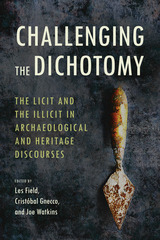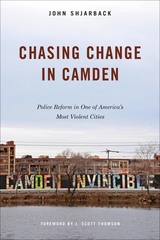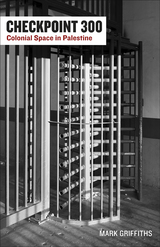
100 Years of Kurt Weill makes a notable addition to the commemoration of the anniversary with the English-language publication of two major Weill librettos, both translated and introduced by international opera director Jonathan Eaton. Written in 1925, Royal Palace is a one-act opera with a libretto by surrealist/expressionist poet-playwright Yvan Goll. It was one of the first operas to incorporate film. The other work, Die Bürgschaft (The Pledge), was inspired by a dark social parable by Johann Gottfried von Herder and written in collaboration with Caspar Neher. The piece was banned in 1933 by the Nazi regime because of its controversial content and was not restaged in its original form until Eaton’s 1998 and 1999 productions in Bielefeld, Germany, and at the Spoleto Festival U.S.A.
This special issue specifically addresses the theatrical context of Weill’s music, exploring new perspectives on the artist and his work and on recent developments in Weill scholarship. These articles, combined with the previously unpublished works, make 100 Years of Kurt Weill a considerable and unique contribution to the centenary commemoration of his birth.
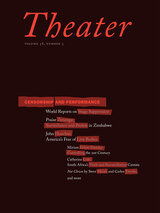
The collection includes an essay that explores the function of live performance in recent freedom-of-expression debates, such as those featuring Janet Jackson and Don Imus, and persistent national anxieties about performers’ bodies. The issue also features an international censorship forum that brings together reports of incidents from Burma, Singapore, Germany, Italy, and the United States. A special report from Zimbabwe provides an in-depth look at the repression of oppositional theater by one of Africa’s most dictatorial regimes while another article looks at REwind: A Cantata for Voice, Tape and Testimony, a new musical composition that takes once-silenced voices recorded for South Africa’s Truth and Reconciliation Commission and transforms them into a hymn for a postapartheid nation. The issue also includes the first publication of an inventive new play that is a satirical as well as chilling look at suppression and dissent in post-9/11 America.
Contributors: Howard Barker, Reverend Billy, Catherine Cole, Mike Daisey, Dean Damjanovski, Miriam Felton-Dansky, Jacob Gallagher-Ross, John Houchin, Rabih Mroué, Freddie Rokem, Tom Sellar, Fadi Toufiq, Praise Zenenga

Contributors. Tilmann Broszat, Boris Charmatz, Kenneth Collins, Thomas F. DeFrantz, Sigrid Gareis, André Lepecki, Sodja Lotker, Florian Malzacher, Jay Pather, Suely Rolnik, Tom Sellar, Miranda Wright

Elfriede Jelinek and The Princess Plays includes an article on Jelinek’s changing position in the world of letters by Gitta Honegger, a leading Jelinek scholar and translator. Accompanying this major article is Honegger’s extended interview with the author; they discuss Jelinek’s aesthetic influences and ideas, what it’s like to win the Nobel Prize, and its implications for the writer. In addition to the first English-language publication of three short plays from Elfriede Jelinek’s Princess Plays, this issue of Theater includes Gitta Honegger’s extended and deeply personal interview with Jelinek, as well as Honegger’s article on her changing position in the world of letters since winning the 2004 Nobel Prize. The issue, which also includes articles on France’s Théâtre du Soleil, offers a compelling portrait of Jelinek and a rare introduction to her provocative theater.
Contributors. Duccio Bellugi, Gitta Honegger, Elfriede Jelinek, Robert Kluyver, Marina Kotzamani, Judith Miller, Ariane Mnouchkine, Béatrice Picon-Vallin, Anthony Richter, Gordon Rogoff, René Solis, Emmanuel Wallon, Philippa Wehle

In the first English-language collection to examine twenty-first-century Russian theater, this special issue of Theater also includes the complete texts of two new Russian plays, published for the first time in English. Ivan Vyrypaev’s Oxygen is a poetic panorama of new Russian identity set to techno music, and Danila Privalov’s 5-25 explores traditional Dostoyevskian existential themes in the language of a new generation. One contributor chronicles the sweeping cultural and institutional changes in the Russian theater since 2000, while another provides an overview of the regional theater system in the world’s most geographically vast country. Another essay explores the development of the new playwriting movement, identifying its key writers and producers. This special issue also includes interviews with the movement’s directors and producers. Additionally, it contains letters, previously unpublished in English, from the Moscow Art Theater’s Olga Bokshanskaya to the Russian theatrical titan Vladimir Nemirovich-Danchenko, reporting on the Moscow Art Theater’s legendary U.S. tour in 1920–22, which was recorded in theater history as a turning point for American acting.
Contributors. AKHE, Dmitri Chernikov, Nina Chusova, Marina Dmitrievskaya, Sasha Dugdale, John Freedman, Elena Gremina, Nina Karpova, Mindaugus Korbauskis, Ryan McKittrick, Arkady Ostrovsky, Danila Privalov, Victor Rizhakov, Yana Ross, Tom Sellar, Kirill Serebrennikov, Anatoly Smeliansky, Julia Smeliansky, Ivan Vyrypaev

Contributors: David Bruin, Annie Dorsen, Shonni Enelow, Miriam Felton-Dansky, Jacob Gallagher-Ross, Caden Manson, John H. Muse, Jemma Nelson, Jennifer Parker-Starbuck, Alexandro Segade, Tom Sellar
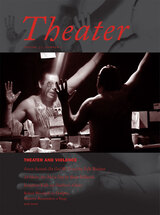
In Theater and Violence, through interviews, play excerpts, and full-length plays—including the first American publication of two major German playwrights and directors—theater artists offer their own narratives for humankind’s violent psychologies. One full-length play, Falk Richter’s Seven Seconds (In God We Trust), probes the mind of an American pilot moments before he releases a bomb on a city below. Another, René Pollesch’s 24 Hours Are Not a Day, humorously explores the ironies and pathologies of globalization after September 11. The issue also includes a commentary on the National Endowment for the Arts’ Shakespeare presentations for the U.S. military; interviews with Russian theater artists on the first anniversary of the Chechen rebels’ siege of a Moscow theater; and Jonathan Kalb’s powerful adaptation of Heiner Müller’s Mauser, set in Tikrit.
Contributors. Josh Fox, Gitta Honegger, Jonathan Kalb, Anna Kohler, James Leverett, Mark Lord, Marlene Norst, René Pollesch, Falk Richter, Yana Ross, Scott Saul, Tom Sellar, Catherine Sheehy, Robert Woodruff
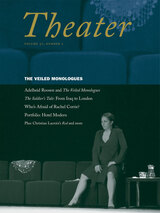

READERS
Browse our collection.
PUBLISHERS
See BiblioVault's publisher services.
STUDENT SERVICES
Files for college accessibility offices.
UChicago Accessibility Resources
home | accessibility | search | about | contact us
BiblioVault ® 2001 - 2025
The University of Chicago Press


